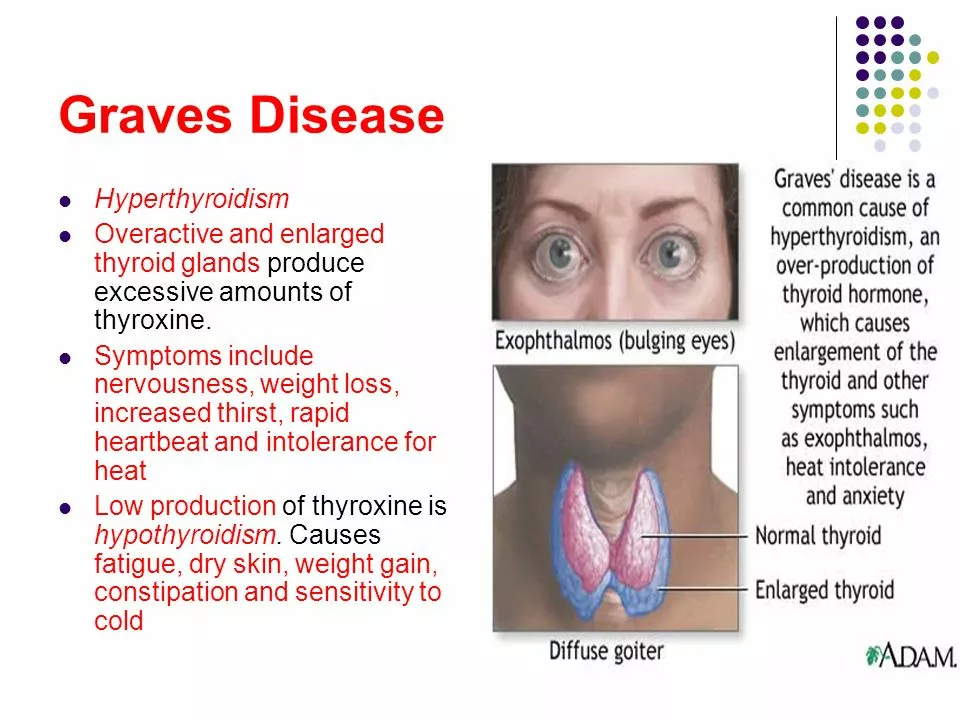Understanding Hyperthyroidism: A Brief Introduction
In this article, we will delve into the various types of hyperthyroidism, a condition characterized by an overactive thyroid gland. The thyroid gland is responsible for producing hormones that regulate various processes in our body, including metabolism, heart rate, and body temperature. When the thyroid produces too much hormone, it can lead to a range of symptoms and complications. As we explore the different forms of hyperthyroidism, we will also discuss their causes, symptoms, and treatment options.
Graves' Disease: The Most Common Cause of Hyperthyroidism
Graves' disease is an autoimmune disorder and the most common cause of hyperthyroidism. In people with Graves' disease, the immune system mistakenly attacks the thyroid gland, causing it to produce excessive amounts of thyroid hormone. This overproduction can lead to various symptoms, including weight loss, rapid heart rate, and irritability. Treatment options for Graves' disease typically include medications to control thyroid hormone production, radioactive iodine therapy, or surgery to remove the thyroid gland.
Toxic Nodular Goiter: When the Thyroid Gland Becomes Overactive
Toxic nodular goiter, also known as multinodular goiter, is another form of hyperthyroidism where the thyroid gland becomes enlarged and develops small, non-cancerous growths called nodules. These nodules can produce excessive amounts of thyroid hormone, leading to symptoms such as fatigue, muscle weakness, and heat intolerance. Treatment for toxic nodular goiter may involve medications to control hormone production, radioactive iodine therapy, or surgery to remove the affected portions of the thyroid gland.
Thyroiditis: Inflammation of the Thyroid Gland
Thyroiditis refers to the inflammation of the thyroid gland and can be caused by various factors, such as infections, medications, or autoimmune disorders. In some cases, thyroiditis can lead to hyperthyroidism as the inflamed thyroid gland releases stored thyroid hormones into the bloodstream. Symptoms of thyroiditis-induced hyperthyroidism may include anxiety, tremors, and difficulty sleeping. Treatment for thyroiditis typically involves addressing the underlying cause of the inflammation, as well as medications to manage symptoms.
Excess Iodine Intake: A Rare Cause of Hyperthyroidism
While iodine is essential for proper thyroid function, consuming too much iodine can sometimes lead to hyperthyroidism. This is especially true for individuals who already have an existing thyroid condition. Excess iodine intake can cause the thyroid gland to produce excessive amounts of thyroid hormone, leading to symptoms such as increased appetite, mood swings, and difficulty concentrating. Treatment for iodine-induced hyperthyroidism typically involves reducing iodine intake and medications to manage symptoms.
Thyroid Hormone Resistance: A Genetic Condition
Thyroid hormone resistance is a rare genetic condition in which the body's cells are less sensitive to thyroid hormones. This can result in the thyroid gland producing more hormones in an attempt to compensate for the reduced sensitivity. Symptoms of thyroid hormone resistance can be similar to those of other forms of hyperthyroidism, such as weight loss, rapid heart rate, and anxiety. Treatment for thyroid hormone resistance typically involves medications to control the production of thyroid hormones.
Postpartum Thyroiditis: A Temporary Form of Hyperthyroidism
Postpartum thyroiditis is a temporary form of hyperthyroidism that can occur in some women after giving birth. It is thought to be caused by the immune system attacking the thyroid gland during pregnancy, resulting in inflammation and the release of stored thyroid hormones. Symptoms of postpartum thyroiditis may include fatigue, irritability, and difficulty sleeping. Treatment for postpartum thyroiditis often involves medications to manage symptoms, and in most cases, the condition resolves on its own within a year.
Medication-Induced Hyperthyroidism: A Possible Side Effect
Some medications, such as amiodarone, lithium, and interferon-alpha, can potentially cause hyperthyroidism as a side effect. These medications can interfere with the normal function of the thyroid gland, leading to the overproduction of thyroid hormones. Symptoms of medication-induced hyperthyroidism may include weight loss, increased appetite, and heart palpitations. Treatment for this form of hyperthyroidism typically involves adjusting or discontinuing the medication causing the issue, as well as medications to manage symptoms.
Conclusion: Managing Hyperthyroidism and Maintaining Thyroid Health
As we have seen, there are various types of hyperthyroidism, each with its own unique causes, symptoms, and treatment options. If you suspect you may have hyperthyroidism, it is important to consult with a healthcare professional to receive an accurate diagnosis and appropriate treatment plan. By understanding the different forms of hyperthyroidism and taking appropriate steps to manage the condition, individuals can maintain their thyroid health and overall well-being.

